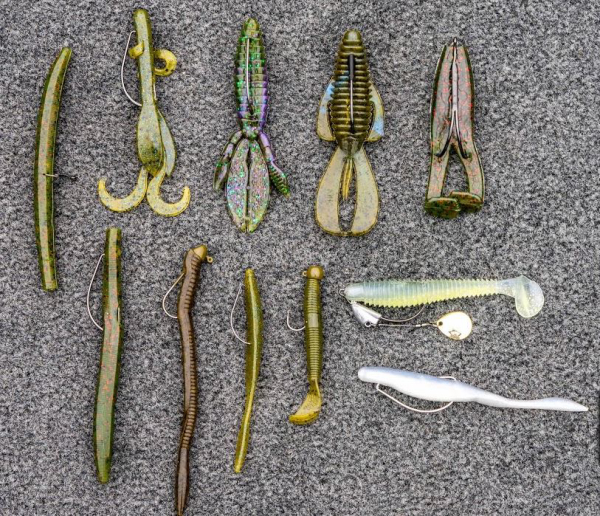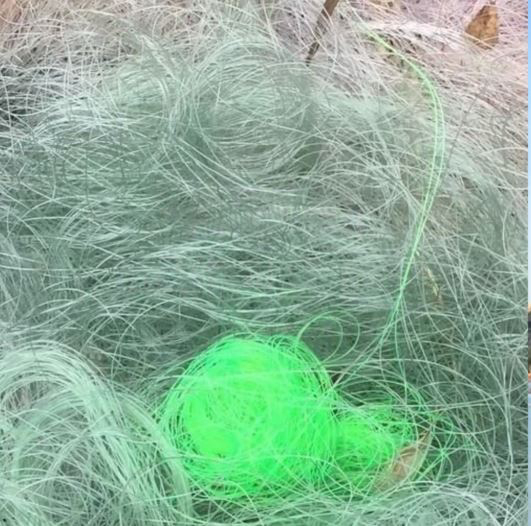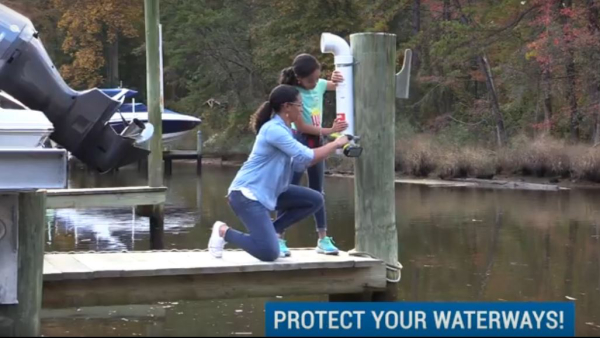If you’ve been on any bass lake in recent years, chances are you’ve seen plenty of used soft plastics floating on the surface. Fish sometimes eat these baits, either in the process of striking them or as a result of baits torn off the hook or discarded over the side by anglers.
Do they do any harm to the bass?

Soft plastics come in a wide variety of shapes and sizes and bass seem to love them all. But do they do any harm when the fish eat them?
Researchers with the Illinois Natural History Survey recently released a study seeming to indicate that largemouths suffer no long term harm from soft plastic lure ingestion.
Here’s the executive summary—sort of the Cliff Notes version:
“We tested whether shape and material composition of ingested Soft Plastic Lures (SPLs) influenced subsequent prey consumption by Largemouth Bass Micropterus salmoides after SPL ingestion. We also quantified the occurrence of SPL ingestion by Largemouth Bass in reservoirs.
“Biodegradable and nonbiodegradable versions of shad, ribbon-tail worm, and finesse worm SPLs were fed to Largemouth Bass, and consumption of natural prey was quantified 1 day and 1 week postingestion.
“Shape and material composition altered prey consumption by Largemouth Bass. Fish that ingested the shad SPL, the largest lure by volume, consumed the fewest number of prey 1 day postingestion. Ingestion of biodegradable SPLs resulted in lower prey consumption rates than ingestion of nonbiodegradable SPLs.
“Largemouth Bass typically expelled the SPL within 9 days of ingestion; all lures were either regurgitated or egested.
“Less than 1% of Largemouth Bass sampled in two Illinois reservoirs had SPLs in their stomachs. Our results suggest that discarded SPLs do not pose a significant long-term threat to the health of individual Largemouth Bass.
*Sanft, E. J., A. P. Porreca, J. J. Parkos III, T. M. Detmer, and D. H. Wahl. 2018.
While the report seems to indicate that eating soft plastics, minus hooks, does not cause long term harm to fish, it does slow their feeding to some extent. And nobody enjoys a boat ramp, shoreline or beach that’s littered with soft plastics, some of which will take years to deteriorate.
Bottom line is, when you tear up a soft bait, put it in your trash bag and dispose of it ashore, along with the wrapping it came in.
It’s also not a bad idea to consider using some of the super-tough brands like Z-Man’s ElaZtech soft lures, made of thermoplastic elastomer (TPE) material, which is reportedly made from non-toxic resins that are also used in cosmetics, baby bottles, and medical products. One of these lures can catch dozens of fish without tearing up and becoming trash, and the company once as a test caught over 100 bass on a Ned style version without having to change it out.
While we’re on the topic of trash generated by fishing, a much more serious problem is discarded fishing line.

Fishing lines, including monofilament, fluorocarbon and braid can all be problematic if not disposed of properly.
Monofilament was bad enough, but now we’ve got eternal-life braid getting tossed into lakes, coastal bays and shoreline cover. Braid lasts virtually forever even out in the sun and salt, and forms a death trap for birds that land on a branch where it’s draped, or worse, try to pick it up to use in their nests.
Not only that, but if you toss it into the lake, it floats, and can easily be picked up by the prop of an outboard motor. The tough fibers then wrap tightly around the shaft and start cutting into the seal, eventually allowing lower unit oil to leak out, which can ruin the lower unit.
The stuff is wonderful fishing line, but it’s a real problem at disposal—even if you put it in your trashcan and it goes to the dump, it will lay there and act as a snare to any critter that stumbles into it for decades. You can hardly cut it up with conventional shears—about the only way to destroy it is to melt or burn it, and it’s not likely the fumes created are exactly healthful from that avenue.

A fishing line disposal tube allows easy collection of line for safe recycling.
The only proper disposal is via designated used line receptacles. These are located at most commercial and community fishing piers and at many boat ramps today, and Bass Pro Shops/Cabelas stores all accept spent line, as well. And Berkley, a major supplier of all types of fishing lines, also welcomes old lines for recycling—send them to Berkley Recycling Collection Center, 1900 18th street, Spirit Lake, Iowa 51360-1099.
Alternatively, if your fishing club or community organization is interested, it’s easy to build recycling tubes for placement on your home waters—here’s a link to BOAT-US with instructions; https://www.boatus.org/monofilament/build-a-bin.